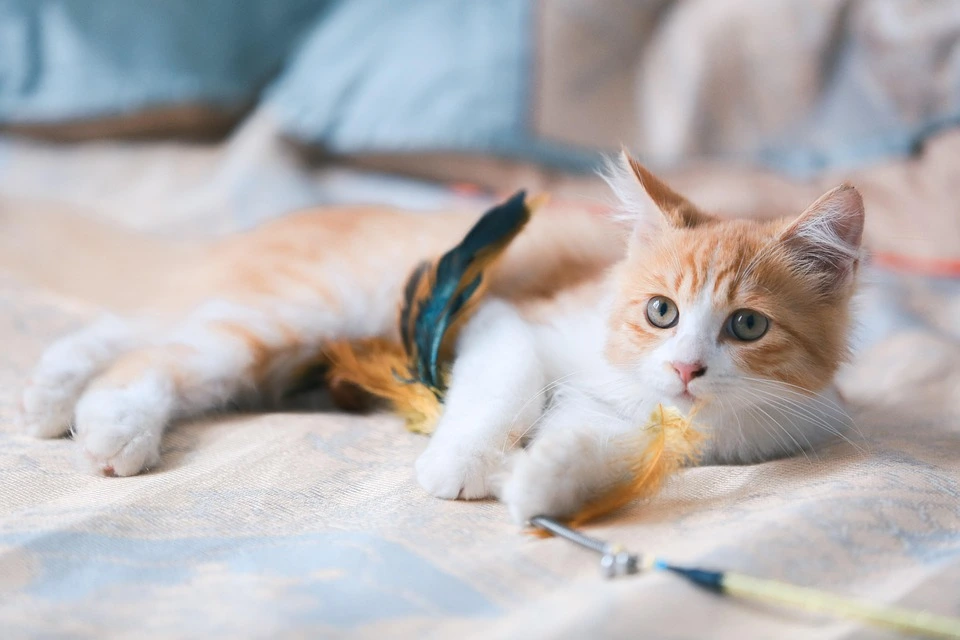By
Shirley
May 12, 2025


While it’s a topic no owner wants to confront, recognizing the quiet “goodbyes” senior cats may offer can help us cherish their final moments and provide the love they deserve. Join a community of fellow cat owners sharing stories and support to connect with others who understand this journey.
Here are key signs your cat might be signaling they’re preparing to leave when a cat is dying.
Cats are notorious for their quirky habit of “gifting” their owners with everything from toys to… less desirable items. But in senior cats, this behavior can take on a deeper meaning as they near the end of life.
Many owners notice their aging cats suddenly retrieving long-lost items—like a forgotten hair tie, a favorite small toy, or even a dusty button—and placing them prominently in areas the owner frequents, such as the bed, doorstep, or favorite chair.
This isn’t just playfulness. In the wild, cats often leave “gifts” as a survival strategy (learn more about feline behavior through organizations like Alley Cat Allies ), but for domesticated cats, it’s believed to be a symbolic gesture of care. As they sense their time is limited, they may be trying to “provide” for their humans one last time or leave a tangible piece of themselves behind. If your senior cat starts meticulously gathering and presenting small items, it could be their way of saying, “I want to leave you something to remember me by as I prepare to die.”
Cats communicate deeply through scent. They have scent glands in their cheeks, paws, and tails, and they use rubbing to mark their territory and bond with loved ones. A cat near the end of life may intensify this behavior, rubbing their face against your hands, legs, or favorite furniture more frequently than ever before. They might also press their bodies against walls, bedding, or even your clothing, leaving their unique scent as a silent reminder of their presence.
This isn’t just about claiming space; it’s a tender effort to leave a part of themselves in the environment they love. For owners, this behavior can feel like a final hug in scent form—a way for the cat to say, “I was here, and I loved you, even as I approach the signs of a cat dying.”
Senior cats that suddenly start exhibiting behaviors they outgrew years ago—like kneading (or “making biscuits”) on blankets or your lap, suckling on fabric, or even curling up in tiny spaces they haven’t used since kittenhood—may be revisiting comforting routines from their early life. Kneading, in particular, is a behavior kittens use to nurse and bond with their mother. When an older cat does this excessively, especially on their owner, it could be a subconscious attempt to reconnect with the safety and love they felt in their prime.
These “baby-like” actions are not a sign of regression in a negative sense but rather a longing to revisit happier, simpler times. It’s as if they’re saying, “Let me remember what it felt like to be loved and safe with you, one more time before I cat die.”
Cats are famously independent, but a dying cat’s approach to companionship often shifts dramatically. Some become unusually clingy, following you from room to room, insisting on sitting on your lap for hours, or meowing softly for attention—even if they were previously aloof. Others may withdraw, seeking out quiet, secluded spots (like under the bed or in a cozy closet) to rest, as if preparing for their final moments in privacy.
Both extremes are driven by the same emotion: a mix of wanting to be close to their human for comfort and needing space to process their physical changes. If your cat’s social behavior suddenly shifts, pay close attention. Clinginess says, “I need you near me as I face this,” while withdrawal may mean, “I’m preparing, but know I love you—these are signs a cat is dying”. For a deeper dive into this touching behavior, watch a helpful video on feline end-of-life rituals
While emotional signals are powerful, physical symptoms often accompany a cat’s declining health when a cat is dying. Look for:
• Reduced appetite or thirst: A sudden loss of interest in food, even favorite treats, or struggling to drink water—key indicators that your cat’s body is slowing down.
• Mobility struggles: Difficulty jumping onto furniture, stumbling, or avoiding stairs due to joint pain or weakness as their energy reserves diminish.
• Grooming neglect: Mats in their fur, unkempt appearance, or lack of interest in cleaning themselves, as they no longer have the energy to maintain their usual hygiene.
• Breathing changes: Labored breathing, wheezing, or prolonged gaps between breaths, which may signal underlying organ dysfunction.
These signs, while not exclusively “goodbye” signals, indicate your cat needs immediate veterinary care(Consult a trusted cat vet to discuss personalized care options). Even in their final days, comfort and pain management can make a world of difference in their quality of life.
If you recognize these signs a cat is dying, here’s how to respond with love:
Create a comfortable space:
Provide soft bedding, easy access to food/water, and a quiet area for them to rest, minimizing physical effort.
Spend quality time:
Whether they want cuddles or solitude, respect their needs. Talk to them, stroke them gently, and let them feel safe in your presence.
Consult your vet:
Discuss pain management and end-of-life options to ensure they’re free from suffering, helping them pass with dignity.
Grieve in your way:
After they’re gone, honor their memory with a keepsake (like a paw print or photo)—explore pet memorial ideas or find solace in comforting pet-loss quotes to help heal.
Cats may not speak words, but their actions speak volumes—especially when saying goodbye. By understanding these signs, you can offer your feline friend the comfort, love, and closure they deserve in their final days. Remember, their “goodbyes” are not just about leaving; they’re a testament to a lifetime of bond and trust. As one heartbroken owner shared, “Looking back, I see now she was preparing me all along. I just didn’t know how to listen for the signs a cat is dying.”
One Response